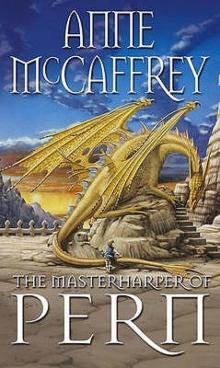- Home
- Anne McCaffrey
Deluge Page 3
Deluge Read online
Page 3
Just like that, Marmion was taken from her mother. And though her mother cried and protested bitterly, she also told her daughter to be on her best behavior, do as she was told, and try to use the advantages that had been put in her path.
Although her heart ached for her mother’s embraces, and even for the kind of often-coarse attentions of the prostitutes, thieves, and murderers in adjacent cells, Marmion found it easy to give the appearance at least of being a good girl. Père Jean, the commander, was usually on duty, and when he was home, showed little interest in the daughter he had adopted largely to please his wife, Dominique LeClerc.
Maman Dominique, as she wished to be called, at first liked to take her pretty little girl shopping and show her off at parties other wives gave for their children. The other mothers, however, were not deceived about Marmie’s origins, and some of the children were beastly enough to warrant a few of the self-defense moves her former cell mates had taught her. The party invitations stopped. After a while Maman Dominique began shopping alone, and the whispers among the servants were that what she was shopping for could not be purchased in the shops but certainly improved her temperament.
Once the novelty of her presence had worn off, then, Marmie’s care and education were provided by paid servants and employees. The girl found them easy to manipulate, and she was mostly able to do as she pleased.
Then one day, when she was not yet thirteen years old, that world changed for her too. Père Jean came home after a year in space and saw not a daughter, but a blossoming young woman. He made a point of asking Marmie to do something with him alone—something intimate—but the girl’s time in prison among worldly women had made her wiser than her years or her wide, innocent eyes indicated. She told Maman Dominique about Père Jean’s request. Maman Dominique went to speak to her husband herself, and when she returned, the couple had apparently decided it was time for Marmie to be sent to boarding school.
There, exercising the charm and charisma that came from her genuine interest in the people around her, she made many new friends and forged alliances that she cherished still.
While living with her adoptive parents, she had tried to bribe servants and tradespeople to take messages to her real parents and perhaps get some word of them in return, but the political coup and its bloody aftermath were too fresh in everyone’s minds. Once away from her second home, however, Marmie quickly found the connections she needed to let her mother and father know where she was and to tell them that she was well and had not forgotten about them. She eagerly awaited the first response from her messenger, but it was a sad one. Though her father still lived, her mother had died shortly after Marmion had been adopted.
For the first time since she left the prison, Marmie wept. Then, after a while, she set her grief aside in order to try to liberate her father. To that end, she strengthened her network with the prison, and in time was able to arrange to exchange messages with him almost weekly.
When her classmate Madelaine Algemeine invited her home for the holidays and Marmion met her handsome brother, Marmie’s soon-to-be beloved Gabriel, her life changed drastically once more. Gabriel was heir to the Algemeine fortune, had inherited their business acumen, had a pragmatic attitude toward politics, and had many influential friends. On the other hand, he was enough of an idealist to find her tainted origins romantic, and made a personal quest of helping her free her father. Meanwhile he used family connections to buy the de Revers family properties, and on their wedding day, with Marmion’s frail father there to give her away, presented her with the family lands as a wedding present. Père Jean was in space at the time, but Maman Dominique was invited, at her real father’s suggestion, to serve as mother of the bride.
Marmie’s protests that she did not wish to be disloyal were dismissed by her father. “You and I know who your mother was,” he told her.
“But when they took me, it broke her heart,” Marmie said. “She did not survive long afterward.”
“Perhaps, but your mother would have seen your adoption as your only hope to grow up in freedom and with some privilege. We both hated for you to be taken by strangers who were our enemies, but you have not fared badly. From all that you’ve told me, Madame LeClerc saw that you were cared for and when the time came, protected you in such a way that it led to your marriage to Gabriel. For this she deserves our thanks and respect.” When Marmion still looked doubtful, her father smiled a wry broken-toothed smile. “Also, ma chérie, one must consider that although your good fiancé has freed me, I am still not a popular man with our leaders, and must depend upon the goodwill of my adversaries to remain alive and free to see my grandchildren.”
And so Dominique LeClerc and Marmion’s beloved father presided at her wedding. Madelaine Algemeine was the maid of honor; other classmates were bridesmaids. And the LeClerc servants and employees were all invited to the wedding feast. Also present, though less conspicuously, were the contacts, go-betweens, and messengers, including two prison guards, whom Marmie and Gabriel had used to free her father.
Oddly enough, her father and Gabriel’s passed away within weeks of each other, leaving Gabriel as the head of his family and its business concerns. Madelaine married his closest friend, who entered into the Algemeine family business as well.
With her respectability assured, Marmion often returned with baskets of food, toiletries, and books for the prisoners in both the men’s and women’s sections of the Bastille. She was careful to always bring similar dainties for the guards and prison employees, and asked after their health and their families. This was not because, as she let the prisoners old enough to remember her know, she was grateful for the care given her as a child, but so they would permit the prisoners to keep and use her gifts. Many of these people were no more criminal than her parents, and had in fact been friends and comrades of her parents, but were not fortunate enough to have someone to see to their release.
Oh, yes, she was familiar with prisons, with guards and matrons and inmates alike, but once her own business acumen and the enterprises she had inherited from her husband made her wealthier than anyone had ever imagined possible, those who spoke of her origins mentioned only the original luster of the de Revers name. She thought it unnecessary to disillusion them about the less-than-glamorous aspects of her past.
So, although Marmion dreaded going back into captivity, she did not experience the fear or the humiliation Colonel Zachariah Cally no doubt hoped she would. Her main concern was for her crew and passengers.
When they arrived at what was euphemistically referred to as the reception area of the prison, they were separated by gender, but the initial order was the same. “Shave ’em, strip ’em, hose ’em down, and suit ’em up.”
The Kanaka women accepted this mistreatment stoically, their misery showing only in their eyes, but some of Marmion’s women crew members tried to fight. “Tell them to cooperate,” Marmion whispered to Adrienne. “Accept it as the local style. The shave seems brutal now, but it’s that or involuntary dreadlocks and lice later. Don’t fight, no matter what. You cannot win, and they will do you real damage if you resist.”
“Shut up, you,” the nearest guard said, yanking Marmion’s head back by her flowing curls. “You’re no different than the rest of these sluts to us and you don’t give orders here.” She shoved her toward one of the chairs surrounded by piles of hair. “Take a load off, queenie.”
But a stern voice contradicted her. “Not her, not yet. Put her in uniform and give her one of our VIP suites. Make sure she doesn’t hurt herself.”
They led her down claustrophobic corridors between cold cell blocks to a tiny bare room with a hard slab for a bed and bench and a stinking hole in the floor to drain waste. The door had no bars, just a slot for food at the bottom. She was sure there would be cameras hidden somewhere in the ceiling or the door and that the door would have a one-way panel through which they could observe her without her being able to see them.
As the door closed and locked be
hind her, she heard other cell doors clanging shut.
CHAPTER 4
RONAN, MUREL, AND Sky cleared the bay and burst into the port master’s office. The port master, a whippetlike woman with a silver buzz cut, stood staring out into the bay and spun around to face the interlopers.
“What are you kids doing here?”
They didn’t know her, but her name tag said, CHIEF C. BROWN.
“We came to warn you,” Murel told her. “Marmie—Madame—has been arrested and taken to Gwinnet Incarceration Colony by some corrupt Company Corpsmen. We need help getting word to her friends and allies so they can get her released.”
“Why did they send kids to tell us? The Piaf—”
“They confiscated the Piaf and all of the crew and passengers,” Ronan told her. “They may be headed here—”
The woman returned her attention to the docking bay, shaking her head. “Nope. You’re a little late. They just arrived.”
The twins followed her gaze. The big ship’s hatch had opened and triple files of Company Corpsmen marched double-time over the gangplank down the bay, heading straight for them.
Come on, Mur, we gotta get out of here, Ronan said, pushing through the office’s interior hatch.
Where to? Murel asked as they raced down the long corridor.
Marmie’s house.
That’s the first place they’ll go! she protested.
I don’t think so. Not with her in custody already. They’ll be too busy taking over everything else. Meanwhile maybe we can use her com system to get word out about her arrest.
But they’ll take over the com systems first, she argued.
They found the first lift that scaled all levels of the station and took it up to Marmie’s penthouse. The weather was set on fine—a nice spring day. The house was open, being run by Marmie’s housekeepers in her absence.
“Slainté, Mrs. Fogarty,” Ronan called as they raced for the com room.
“You’re back!” the housekeeper said. “No one told me you were coming. And me without dinner for herself!” She followed them to the com room, where Murel sat at the keyboard composing a message to send to Marmie’s entire list of contacts. There was no time now to sort out who was who. “You’re tracking water all over my floors again, and what is that animal with you, a big rat?”
Ronan said, “No, Mrs. Fogarty. He’s an otter.”
“First seals, now an otter. This place is turning into an aquarium.”
“Never mind about that, Mrs. Fogarty. Soldiers are on their way, probably to impound the station and arrest us all.”
“Why? I’ve done nothing wrong.”
“They’ve taken Marmie and are confiscating all of her stuff, arresting her staff as accomplices,” Ronan told her.
Bollocks! Murel swore, and turned around with tears of frustration in her eyes.
No luck? Ronan asked her.
I don’t think so. Just as I hit Send, the system shut down.
The com screen came on and a uniformed man said in a deep gruff voice, “Attention all personnel of the space station designated as Versailles. This property is under an impound and seizure order according to statute 68795-Zed and all personnel are subject to questioning regarding the alleged criminal activities of the owner.”
“That’s preposterous!” Mrs. Fogarty exclaimed. “They can’t do that! That’s piracy, that is.”
“’Fraid they can, missus,” Ronan said. “Look!”
The surveillance screens showed three flitters landing in the east garden. An improbable number of armed troops poured from each and fell in behind the last passenger, who wore the official robes of a Federation Councilman.
“That’s just wrong,” Mrs. Fogarty said, pointing to the councilman. “They don’t dress up like the Grim Reaper unless they’re presiding in court or some such official function. It’s myself should know, since there’s many the time I’ve done up Madame’s robes before and after she’d need of them.”
The twins didn’t answer. “Please don’t tell them we’re here, missus,” Murel said instead. “They’re after us too. We have to hide.”
“What I have to tell them is nothing they’ll be happy to hear,” Mrs. Fogarty said with a grim set to her lips. “Excuse me. I’ve a brand-new broom around here somewhere that I bought before Madame installed the central vacuum to spare me back. I feel the need of it now.”
Ronan and Murel were already dashing for the nearest access to the pool, Sky running circles around them. It wasn’t actually a pool. Marmie had built it specifically for them, fashioned as a sort of artificial river that ran under the house and out around the grounds, among garden fountains and small ponds, before looping back inside again to form a lovely stream inside the great room. They felt they could hide there.
What if they catch us in seal form and make us change? Murel asked.
Why would they do that? Our secret may be a bit more public than it used to be but I doubt it’s the gossip of the Corps. Besides, they’re very noisy. We’ll know they’re coming long before they know we’re there, and that will give us time to change.
Otters dig dens in water banks, Sky said. Dens are good to hide in.
I don’t think we can dig into the stuff under Marmie’s lawn, Sky, Murel told him. It’s not real. It would be like trying to den into the side of the spaceship.
While their otter friend was thinking about that, they zipped out of their dry suits and tucked them into the pouches strapped to their backs. Then they dove into the pool, swimming quickly to the portion flowing under the house. To preserve their secret, Marmie had not set cameras near or within the banks of the waterway. Most views of the house and grounds included only glimpses of it.
Now what? Ronan wondered.
We keep our ears peeled, Murel said. If my message was transmitted before they cut it off, this will all get sorted out soon.
If not?
Perhaps we can sneak into the com center, disable the soldiers there, send again, and skedaddle?
And how would we do that?
I don’t know. But we must do something or we might as well have stayed and waited to be arrested at home.
They’d kept their heads above water so they could hear what was happening above them. The house was well soundproofed, but their hearing was much better in seal form than the average human’s.
“Children? I’ve no idea what you’re talking about,” Mrs. Fogarty was saying.
“You’d do well to cooperate, lady. Two children and a small brown mammal were seen running from the docking bay by our crew when we docked.”
“There are many children who live here. Madame runs a school, you know. And children do have pets.”
“They were seen entering the maintenance lift. That’s off-limits to children, is it not?”
“As if that sort of thing ever stopped an inquisitive youngster!” Mrs. Fogarty scoffed. “But there are no children here, as you can see for yourselves. They must have popped off on one of the other levels.”
“Tear the place apart,” the soldier who’d been doing the questioning said.
“Here now!” Mrs. Fogarty protested.
“Lay that broom down, lady, and step away from it,” the trooper demanded.
“I’ll lay it up side of your head,” she threatened. There was a sizzling sound and a thump and no more from the housekeeper.
I hope they just stunned her, Ronan said.
Murel hoped so too, because she knew that not only was Mrs. Fogarty loyally defending Marmie’s property and privacy, she was also providing a distraction. Murel had never been stunned. She hoped it didn’t hurt.
“Search the grounds,” the officer in command said. “Look for the kids, the animal, or any fresh sign. Our orders are to remove all personnel, including children.”
“Right, Captain, sir. Uh—permission to ask a probably dumb question, sir?”
“Granted, but make it snappy.”
“If we remove all personnel, who’s going to run
this thing? It’s a valuable piece of property.”
“Very astute of you, Private. You aspire to company management, do you?”
“Sir, no, sir. There is no higher aspiration than to serve the Corps, sir.”
“Damn straight. In answer to your question, however, Private, I don’t suppose you happened to notice that ship that docked a short time after we did?”
“No, sir.”
“Filled with qualified Corps-trained station maintenance personnel. Now round up those kids and that animal so we can load and lock the prisoners up and leave. Is that clear?”
“Sir, yes, sir. One more thing, sir?”
“Anything for you, Private,” the officer said through what sounded like gritted teeth.
“Signs, sir?”
“Sign what?”
“You said to look for fresh signs? Sir?”
“Sign, Private, sign. Where’s your sergeant anyway? Sergeant Montgomery!”
A distant voice barked in a tone that would have done credit to the twins’ seal cousins. “Here, sir!”
“Kindly explain to your man here what looking for fresh sign means in reference to our current mission,” the captain called back.
“Otter shit!” the sergeant barked back, as if he were swearing.
Otters are not messy, Sky said. Also, otters do not leave signs when they have not eaten for a long time, and I have not eaten since we left the deep sea otters.
Glad to hear it, Sky, Ronan said. Too bad nobody here keeps a dog. I bet most of these Corpsmen wouldn’t know otter poo from doggie doo.
I wouldn’t be so sure of that, Ro, Murel told him. The one in command sounded like he knew what he was talking about. Remember, the company gets a lot of its recruits from worlds like Petaybee and Halau. Maybe that soldier and even some of the others are from places where people and animals live close together. For all we know he could be as good as Aunty Sinead.

 The Renegades of Pern (dragon riders of pern)
The Renegades of Pern (dragon riders of pern) Dragonquest
Dragonquest Moreta (Dragonlady of Pern)
Moreta (Dragonlady of Pern) The Masterharper of Pern
The Masterharper of Pern If Wishes Were Horses
If Wishes Were Horses Dragonflight
Dragonflight No One Noticed the Cat
No One Noticed the Cat The White Dragon
The White Dragon A Gift of Dragons
A Gift of Dragons Harper Hall - Dragonsong
Harper Hall - Dragonsong Brain Ships
Brain Ships All The Weyrs of Pern
All The Weyrs of Pern The City and the Ship
The City and the Ship The Chronicles of Pern: First Fall
The Chronicles of Pern: First Fall Acorna’s Search
Acorna’s Search Powers That Be
Powers That Be Second Wave
Second Wave Chronicles of Pern (First Fall)
Chronicles of Pern (First Fall) The Kilternan Legacy
The Kilternan Legacy Decision at Doona
Decision at Doona Dragondrums (dragon riders of pern)
Dragondrums (dragon riders of pern) Dragonsinger (dragon riders of pern)
Dragonsinger (dragon riders of pern) The Master Harper of Pern
The Master Harper of Pern Crystal Singer
Crystal Singer Acorna’s People
Acorna’s People Pegasus in Flight
Pegasus in Flight Sky Dragons Dragonriders of Pern
Sky Dragons Dragonriders of Pern Dragonriders of Pern 4 - Dragonsinger
Dragonriders of Pern 4 - Dragonsinger Treaty at Doona
Treaty at Doona Damia's Children
Damia's Children Stitch In Snow
Stitch In Snow The Rowan
The Rowan Dinosaur Planet
Dinosaur Planet The Year of the Lucy
The Year of the Lucy The White Dragon p-4
The White Dragon p-4 Power Lines
Power Lines Catacombs
Catacombs Moreta
Moreta Dragonsinger
Dragonsinger Crystal Line
Crystal Line The Renegades of Pern
The Renegades of Pern Moreta - Dragonlady of Pern p-8
Moreta - Dragonlady of Pern p-8 Deluge
Deluge The Skies of Pern
The Skies of Pern Acorna's Quest
Acorna's Quest Dragon's Kin
Dragon's Kin Sassinak
Sassinak![Crystal Universe - [Crystal Singer 03] - Crystal Line Read online](http://i1.bookreadfree.com/i1/03/31/crystal_universe_-_crystal_singer_03_-_crystal_line_preview.jpg) Crystal Universe - [Crystal Singer 03] - Crystal Line
Crystal Universe - [Crystal Singer 03] - Crystal Line Freedom's Landing
Freedom's Landing Acorna’s Quest
Acorna’s Quest Masterharper of Pern
Masterharper of Pern Restoree
Restoree Dolphins of Pern
Dolphins of Pern The Ship Who Saved the Worlds
The Ship Who Saved the Worlds Acorna's Triumph
Acorna's Triumph Acorna's Rebels
Acorna's Rebels![[Acorna 08] - First Warning: Acorna's Children (with Elizabeth Ann Scarborough) Read online](http://i1.bookreadfree.com/i1/04/06/acorna_08_-_first_warning_acornas_children_with_elizabeth_ann_scarborough_preview.jpg) [Acorna 08] - First Warning: Acorna's Children (with Elizabeth Ann Scarborough)
[Acorna 08] - First Warning: Acorna's Children (with Elizabeth Ann Scarborough) Dragonsong (dragon riders of pern)
Dragonsong (dragon riders of pern) Dragonriders of Pern 6 - Dragondrums
Dragonriders of Pern 6 - Dragondrums The Death of Sleep
The Death of Sleep Crisis On Doona
Crisis On Doona Nimisha's Ship
Nimisha's Ship Black Horses for the King
Black Horses for the King Changelings
Changelings Freedom's Choice
Freedom's Choice The Lady
The Lady The Coelura
The Coelura Catalyst
Catalyst The Unicorn Girl
The Unicorn Girl Freedom's Ransom
Freedom's Ransom Nerilka's Story
Nerilka's Story Dragon's Fire
Dragon's Fire Generation Warriors
Generation Warriors Lyon's Pride
Lyon's Pride Dragonseye
Dragonseye Dragon Quest
Dragon Quest Dragondrums
Dragondrums Dragonsong
Dragonsong The Mystery of Ireta
The Mystery of Ireta Dolphins' Bell
Dolphins' Bell To Ride Pegasus
To Ride Pegasus Power Play
Power Play The Dragonriders of Pern
The Dragonriders of Pern An Exchange of Gifts
An Exchange of Gifts The Ship Who Sang
The Ship Who Sang Sky Dragons: Dragonriders of Pern
Sky Dragons: Dragonriders of Pern Maelstrom
Maelstrom Dragons Dawn
Dragons Dawn Dragon Song
Dragon Song The Ship Who Searched b-3
The Ship Who Searched b-3 Damia
Damia Freedom's Challenge
Freedom's Challenge